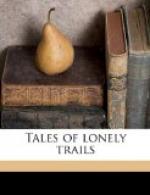The child is father to the man. In the light of this instinct how easy to understand his boyish cruelty. He is true to nature. Unlimited and infinite in his imagination when he hunts—whether with his toys or with real weapons. If he flings a stone and kills a toad he is instinctively killing meat for his home in the cave. How little difference between the lad and the man! For a man the most poignantly exciting, the most thrillingly wild is the chase when he is weaponless, when he runs and kills his quarry with a club. Here we have the essence of the matter. The hunter is proudest of his achievement in which he has not had the help of deadly weapons. Unconsciously he will brag and glow over that conquest wherein lay greatest peril to him—when he had nothing but his naked hands. What a hot gush of blood bursts over him! He goes back to his barbarian state when a man only felt. The savage lived in his sensations. He saw, heard, smelled, tasted, touched, but seldom thought. The earthy, the elemental of eye and ear and skin surrounded him. When the man goes into the wilderness to change into a hunter that surviving kinship with the savage revives in his being, and all unconsciously dominates him with driving passion. Passion it is because for long he has been restrained in the public haunts of men. His real nature has been hidden. The hunting of game inhibits his thoughts. He feels only. He forgets himself. He sees the track, he hears the stealthy step, he smells the wild scent; and his blood dances with the dance of the ages. Then he is a killer. Then the ages roll back. Then he is brother to the savage. Then all unconsciously he lives the chase, the fight, the death-dealing moment as they were lived by all his ancestors down through the misty past.
What then should be the attitude of a thoughtful man toward this liberation of an instinct—that is to say, toward the game or sport or habit of hunting to kill? Not easily could I decide this for myself. After all life is a battle. Eternally we are compelled to fight. If we do not fight, if we do not keep our bodies strong, supple, healthy, soon we succumb to some germ or other that gets a hold in our blood or lungs and fights for its life, its species, until it kills us. Fight therefore is absolutely necessary to long life, and Alas! eventually that fight must be lost. The savages, the Babylonians, the Persians, the Greeks all worshipped physical prowess in man. Manhood, strength—the symbols of fight! To be physically strong and well a man must work hard, with frequent intervals of change of exercise, and he must eat meat. I am not a great meat eater, but I doubt if I could do much physical labor or any brain work on a vegetable diet. Therefore I hold it fair and manly to go once a year to the wilderness to hunt. Let that hunt be clean hard toil, as hard as I can stand! Perhaps nature created the lower animals for the use of man. If I had been the creator I think I would have made it possible for the so-called higher animal man to live on air.




